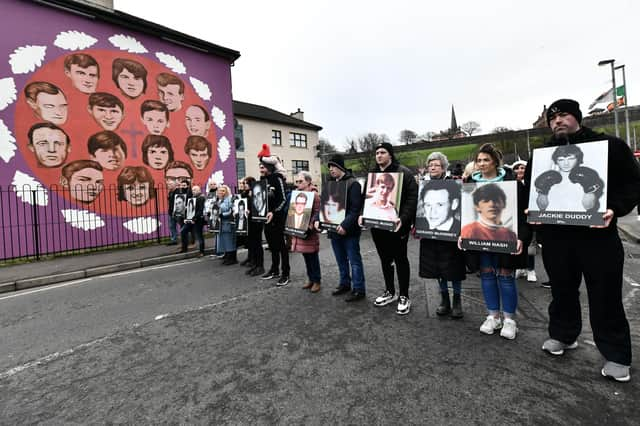Unionists should join forces with Bloody Sunday families


One was War in an Irish Town by Eamonn McCann, the other was simply called Ulster, a ‘Penguin Special’ published in 1972 and written by the already highly regarded Sunday Times Insight Team.
Eamonn’s book was partisan, clear in where it stood, and extremely critical of unionism and the British state. What would surprise many people perhaps, if they were to read Ulster today, is how little its view of Northern Ireland differed from Eamonn’s.
Advertisement
Hide AdAdvertisement
Hide AdIt is a measure of how much damage the IRA did to their own cause that it is impossible to imagine a mainstream British newspaper today producing such a one-sided study of Northern Ireland. Or is it?
Consider what veteran journalist and military historian Sir Max Hastings wrote recently in The Times in a review of Kenneth Branagh’s new film, Belfast. Whilst he praised the warmth of the film, he went on to the lament that “English Tories have [now] climbed deep into bed with the unionists, people little less grotesque than they were in my day (emphasis mine)”. Hastings worked as a reporter in Belfast in the late 1960s.
Oscar Wilde famously quipped that there is only one thing worse than being talked about and that is not being talked about.
It was in this spirit perhaps that the January 30 2022 English print edition of the Sunday Times did not even mention the 50th anniversary of Bloody Sunday, despite the high profile historical connection between that newspaper and the events of that day.
Advertisement
Hide AdAdvertisement
Hide AdThat omission speaks volumes about how Northern Ireland has been relegated to a drawer marked ‘finished business’ in Great Britain.
Unionists might shrug their shoulders at this failure of reportage.
The ‘legacy’ process has been a bitter one way street where republicans have been able to paint themselves as victims in a conflict where they were vastly more prolific murderers of innocents than the security services ever were.
It’s logical that unionists feel that, in this context, events like Bloody Sunday receive disproportionate attention.
Advertisement
Hide AdAdvertisement
Hide AdIndeed nationalists and republicans in Derry distinguished themselves by boycotting the dignified commemoration held — just three days before the Bloody Sunday 50th anniversary — in honour of two RUC men murdered by the IRA in the city on January 27 1972, Constable David Montgomery and Sergeant Peter Gilgunn.
At the Bloody Sunday rally held in the Bogside three days after the police memorial were two speakers who were well known fifty years ago: Eamonn McCann and Bernadette Devlin McAliskey.
Also present was Ireland’s minister for foreign affairs and defence, Simon Coveney, together with a smartly attired military attaché. The Irish Army had finally made its way to Derry.
The Taoiseach Micheal Martin was there too.
It was a long way from 1969, when his predecessor Jack Lynch said Dublin was no longer prepared to “stand by and see innocent people injured and perhaps worse”.
But where was unionism that Sunday?
Advertisement
Hide AdAdvertisement
Hide AdThe hallowed ground of the Maiden City had been ceded entirely to nationalism and the civil and military representatives of the Irish state. Any outside observer could be forgiven for thinking that the commemorations were taking place in a Northern Ireland which had already been absorbed by the Republic.
Meanwhile, in London the Brexit promise of a role for unionism at the heart of Westminster has seemingly vanished.
When Dervla Murphy wrote her book A Place Apart in the early 1970s, she thought that indifference from the mainland should encourage the two communities in Northern Ireland to work out their own destiny together.
Unionists could start that work by standing with the Bloody Sunday families.
Advertisement
Hide AdAdvertisement
Hide AdThe reticence is understandable. Shane Paul O’Doherty recently recalled how Bishop Edward Daly had repeatedly rebuffed invitations to join commemorative marches for Bloody Sunday in the late 1980s and early 1990s when he felt they were dominated by apologists for Sinn Féin: “The reason I have not participated in these marches is quite simply because I feel that they were exploited as a platform by some people who are apologists for a campaign of murder and violence, the complete contradiction of what Bloody Sunday meant and means to me.”
Derry is now however an SDLP town again. The commemorations on Sunday were not organised by Sinn Féin, or apologists for violence.
And any unionist who doubts that murder took place on January 30 1972 should read Douglas Murray’s magisterial book on the subject. Murray is a unionist.
Unionist objection to Bloody Sunday receiving what they see as special attention boils down to concern at the context of the lop-sided legacy process.
Advertisement
Hide AdAdvertisement
Hide AdThere is also perhaps a sense of ‘my country right or wrong’ in the context of the security services who gave so much in the fight against republican and loyalist terrorism.
These two reflexes do not amount to a complete moral position however. It was after all Jim Allister who said that what is morally wrong can never be politically right.
Decent unionists and nationalists should be able to find common moral, if not political, ground. There is every reason why unionists should start that process by taking the moral high ground on Bloody Sunday and attending next January’s commemoration.
Maybe one day nationalists will commemorate the lives of Constable David Montgomery and Sergeant Peter Gilgunn.
Doing the right thing has to start somewhere in any case.
Other opinion articles here:
Advertisement
Hide AdAdvertisement
Hide Ad• Ruth Dudley Edwards: Doug Beattie’s engagement policy gets a boost from Alliance